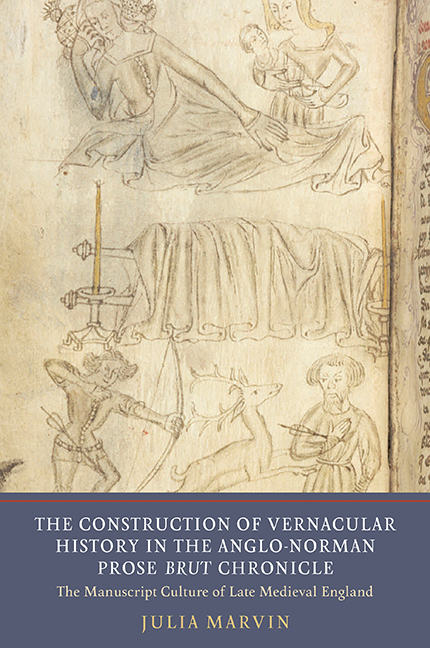 The Construction of Vernacular History in the Anglo-Norman Prose Brut Chronicle
The Construction of Vernacular History in the Anglo-Norman Prose Brut Chronicle from Part I - Construction
Published online by Cambridge University Press: 01 February 2018
At times, King Arthur has seemed to scholars to be notably underrepresented in the literature of late-medieval England, particularly in light of the chivalric pageantry of the court of Edward III. Christopher Dean, for example, declared in 1987 that Arthur ‘is not the major character of medieval English fiction that manuals of Middle English literature with their inevitable chapter on Arthurian romance might suggest’. If this is so, it does not mean that Arthur was unpopular or unimportant in late-medieval written culture: it means that ‘fiction’ is not the best place to find him. The prose Brut chronicle made the literally prosaic Arthur more popular than ever before.
Arthur is the central figure of the Oldest Version of the Anglo-Norman prose Brut, and his reign constitutes its single longest episode. At 418 lines, it is about a tenth of the whole Oldest Version, or as much space as all the kings from Aethelred the Unready to Edward the Confessor, and it is twice as long as the life of Brut. In the later Anglo-Norman and Middle English Bruts, Arthur's story remains largely unchanged except for the eventual addition of prophecies of Merlin.
The audiences of the Oldest Version knew a very different Arthurian story from the one most familiar to audiences after Malory. Gunnore (Guinevere) appears in two sentences, to marry Arthur and to retire to a convent; there is no Grail quest, no Morgan le Fay, no Galahad, and no Lancelot. Here as elsewhere the Brut's account follows the Galfridian plot, conventionally labeled the ‘chronicle’, or English, tradition. The other branch of Arthurian literature, the so-called ‘romance’, or French, tradition epitomized in the poetry of Chrétien de Troyes, offers the erotic intrigues, tournaments, adventures in trackless forests, women in distress, and mystical quests associated with Arthur's court, as well as the adultery of Lancelot and Guinevere. Chrétien's romances and the later French prose Vulgate Cycle were both known in England, but aside from the account of Arthur's fall in the stanzaic Morte Arthur, relatively little of their plots entered the English language until Malory assimilated the matter of both traditions into his massive work.
To save this book to your Kindle, first ensure [email protected] is added to your Approved Personal Document E-mail List under your Personal Document Settings on the Manage Your Content and Devices page of your Amazon account. Then enter the ‘name’ part of your Kindle email address below. Find out more about saving to your Kindle.
Note you can select to save to either the @free.kindle.com or @kindle.com variations. ‘@free.kindle.com’ emails are free but can only be saved to your device when it is connected to wi-fi. ‘@kindle.com’ emails can be delivered even when you are not connected to wi-fi, but note that service fees apply.
Find out more about the Kindle Personal Document Service.
To save content items to your account, please confirm that you agree to abide by our usage policies. If this is the first time you use this feature, you will be asked to authorise Cambridge Core to connect with your account. Find out more about saving content to Dropbox.
To save content items to your account, please confirm that you agree to abide by our usage policies. If this is the first time you use this feature, you will be asked to authorise Cambridge Core to connect with your account. Find out more about saving content to Google Drive.